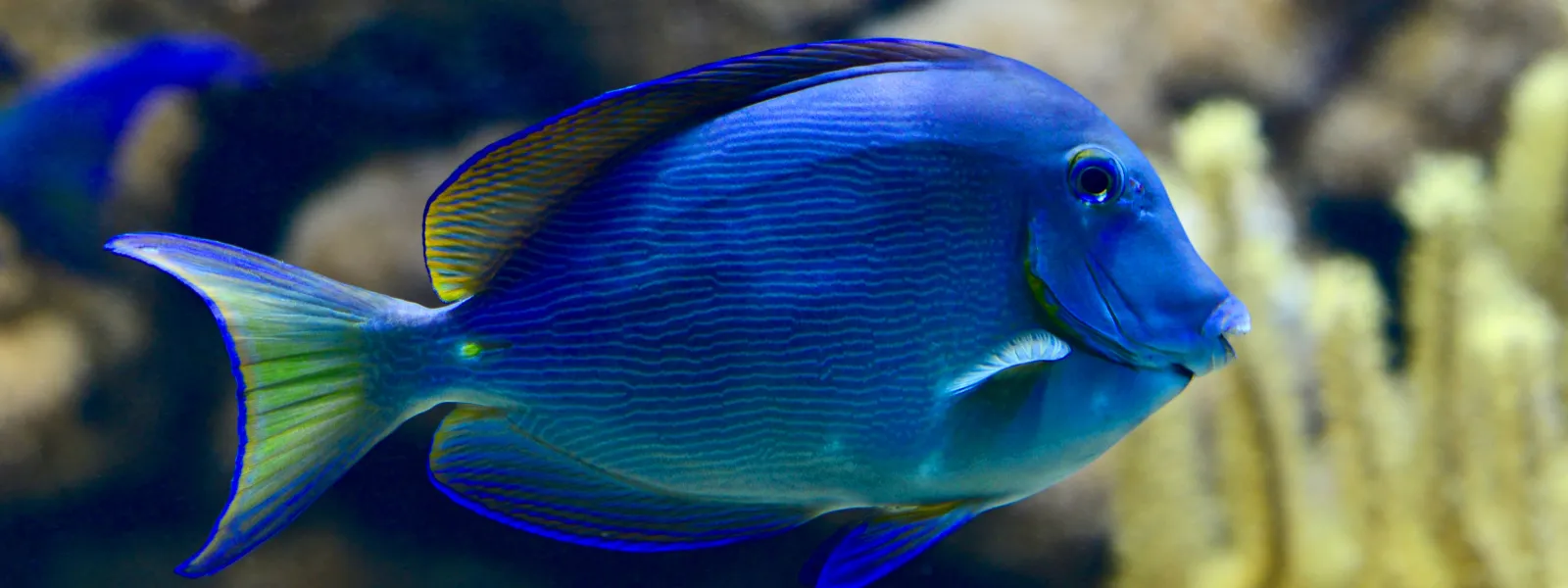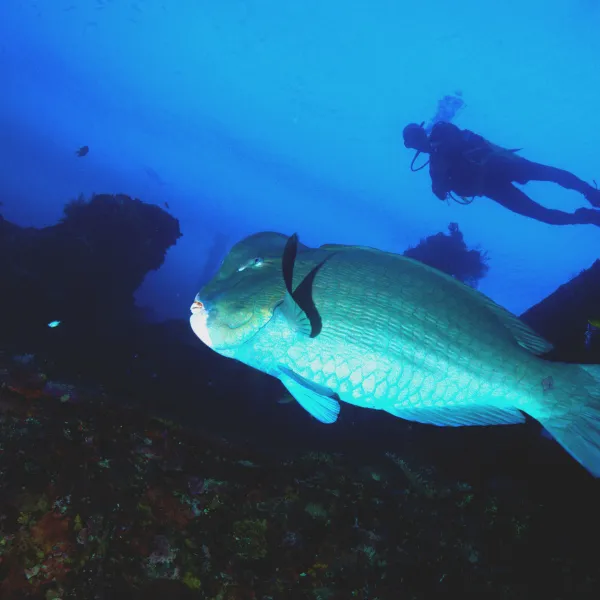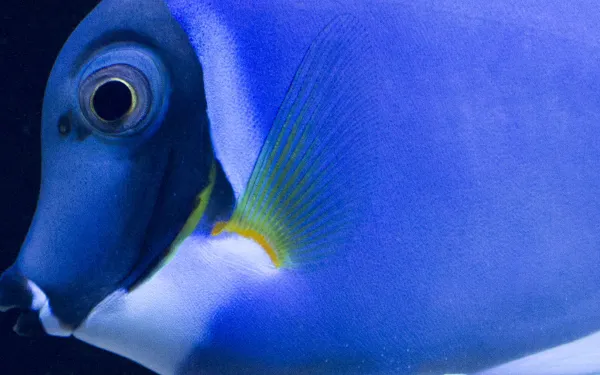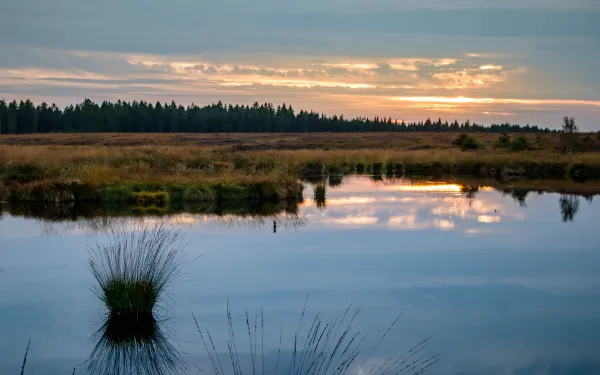
Project
RA Killmer_CC BY-NC-ND 2.0Protecting herbivorous fish, to secure a future for corals
Herbivorous fish rarely go unnoticed. Their brilliant colors illuminate the reef to the delight of scuba divers. But more importantly, these iconic fish are also vital for the conservation of coral reefs.
Herbivorous fish feed on the algae that grow on corals and compete with them for light and oxygen. By eating the algae, these tiny fish play a big role in the survival of the entire ecosystem.
Species of these herbivorous fish include: parrotfish, which eat corals that break off the reef and excrete them as white sand; damselfish, which fend off the macro algae growth that kills coral; and surgeonfish, whose most famous representative is Dory from Finding Nemo.
But corals are quickly losing their greatest allies. Populations of herbivorous fish are dwindling, particularly in the Caribbean.
The overfishing of commercial species is driving artisanal fishermen to capture even the youngest herbivorous fish, preventing those species from replenishing their numbers.
The loss of these fish is one more threat to coral reefs, already fragile ecosystems that are increasingly vulnerable to climate change. Preserving our reefs will ensure we continue to enjoy the services they provide. Among other things, coral reefs act as fish hatcheries, natural barriers against storms and hurricanes, and the source of medicines that treat illnesses like cancer and Alzheimer’s.

Related projects
Latest News

Herbivorous fish and coral reefs: a relationship we must protect
Vibrantly colored herbivorous fish feed on the macroalgae that covers coral reefs. These fish play a fundamental role in the health of marine environments by cleaning the algae that deprive corals of light and oxygen. They are vital for maintaining the ecological equilibrium necessary for the reef’s survival. Recommendations for saving herbivorous fish Targeted measures are urgently needed to maintain and improve the health of coral reefs. Protecting the colonies of herbivorous fish that sustain them would go a long way toward helping reefs recover. In order to do so, AIDA recommends: Establishing and adopting strong fishing management and conservation strategies that will help herbivorous fish (particularly parrotfish) populations recover. This includes fishing management initiatives, establishing temporary or location-based bans, and strict quotas on fishing. Other measures include encouraging fisheries to diversify the species they capture. In the Caribbean, for example, fishing for lionfish—an invasive species—could be promoted as a viable economic alternative in hundreds of fishing communities. Establishing marine protected areas and recovery zones where fishing is prohibited. These areas or zones, which should include at-risk habitats, need urgent protection because they are considered refuges for juvenile and adult fish. Allowing herbivorous fish species to complete their life cycles would contribute to the resilience of key marine environments like coral reefs. Standardize monitoring techniques of fish populations and implement alternative management practices. Encouraging optimal standard practices would allow scientists working in diverse habitats to improve monitoring, as well as fishery and ecosystem management. Among other options, reef restoration is also extremely beneficial, and has already been adopted in several areas of Mexico. Promote comprehensive regional management systems that allow local authorities to share experiences and establish shared management and conservation tools. Create and implement norms and laws that protect reefs and herbivorous fish. These could include laws that promote adequate fishing management practices and effectively combat threats like overfishing and tourism that damage reef habitats. Such laws could also encourage low impact coastal development that incorporates thorough scientific and technical evaluation into the planning process. See THE Fact Sheet (in Spanish)
Read more
Protecting Wetlands: A Ramsar Infographic
Wetlands worldwide are at threat due to changes in land use, pollution and unsustainable development. The Ramsar Convention is an intergovernmental treaty that works to protect wetlands across international borders, and advocates for their wise use. This infographic breaks down why wetlands are so important, and how the application of the Ramsar Convention can help us protect these sensitive and vital ecosystems.
Read more
Six advances for Latin America’s reefs in 2018
In 2018, we joined people and organizations around the world in celebrating the International Year of the Reef. AIDA was part of a global movement to increase awareness of the value of reefs and the threats they’re facing. To advance reef conservation in the Americas, we took part in a variety of legal actions to protect reefs in Mexico and the Caribbean. As always, we’re proud to celebrate the small victories we’ve achieved on the road to environmental justice in 2018. Together with our supporters and allies we: Supported a case in defense of the Veracruz Reef In February, we presented an amicus brief in support of an amparo filed by local residents against the expansion of the Port of Veracruz. We outlined how Mexico’s approval of the project in 2013 violated the nation’s international environmental and human rights commitments. Just a year earlier, the government had reduced the area of the reef system, changing its boundaries to make the project viable. At the time of authorization, adequate scientific information was not available to understand how to avoid damaging the reefs and protect the services they provide to the people of Veracruz. To raise awareness of the issue, we also co-produced a documentary, Battle for the Reefs of Veracruz. Alerted the Ramsar Convention to threats to Puerto Morelos Reef We sent an Urgent Alert to the Secretariat of the Ramsar Convention, alerting them to the threats to Puerto Morelos Reef National Park, a national protected area and Wetland of International Importance. Together with a coalition of civil society organizations, we solicited a visit of international experts to evaluate the risks facing the site, particularly changes in land use in coastal ecosystems due to massive and unsustainable tourism development. Created a Working Group on Threats to Mexico’s Wetlands In May, the Working Group on Threats was created within the National Wetlands Committee, which AIDA helped create in order to motivate Mexico to comply with its obligations to protect at-risk wetlands of international importance. Within the framework of this Group, efforts are being made to strengthen national actions to protect Ramsar ecosystems, including reefs and the herbivorous fish that make their home in them. Supported the protection of 10 species of parrotfish in Mexico’s Caribbean In October we presented a letter of support outlining international environmental and human rights arguments for the inclusion of 10 species of parrotfish on Mexico’s national list of at-risk species. While the inclusion has been acknowledged and accepted, official confirmation is expected early this year. Our efforts supported a proposal of the Health Reefs Initiative that seeks to legally protect parrotfish species, which are critical to maintaining a healthy coral reef ecosystem. Parrotfish and other herbivorous fish feed on algae that compete with corals for light and oxygen, thus enabling the reef to flourish. Helped Establish a Working Group on Corals in Costa Rica In coordination with the Ministry of Environment, we helped organize a working group of academic experts, members of civil society and competent governmental authorities that will propose comprehensive solutions to the problems facing the country’s coral ecosystems. Together we will work to ensure integral solutions to protect Costa Rica’s coral reefs. Supported a Working Group on Herbivorous Fish in Guatemala In coordination with the Healthy Reefs Initiative, academics from San Carlos University and members of the government, we’ve supported the creation of a working group to draft a technical-scientific document that outlines the information necessary for a ministerial decree to prohibit the fishing of herbivorous fish in the Guatemalan Caribbean and, thus, protect the nation’s reefs.
Read more